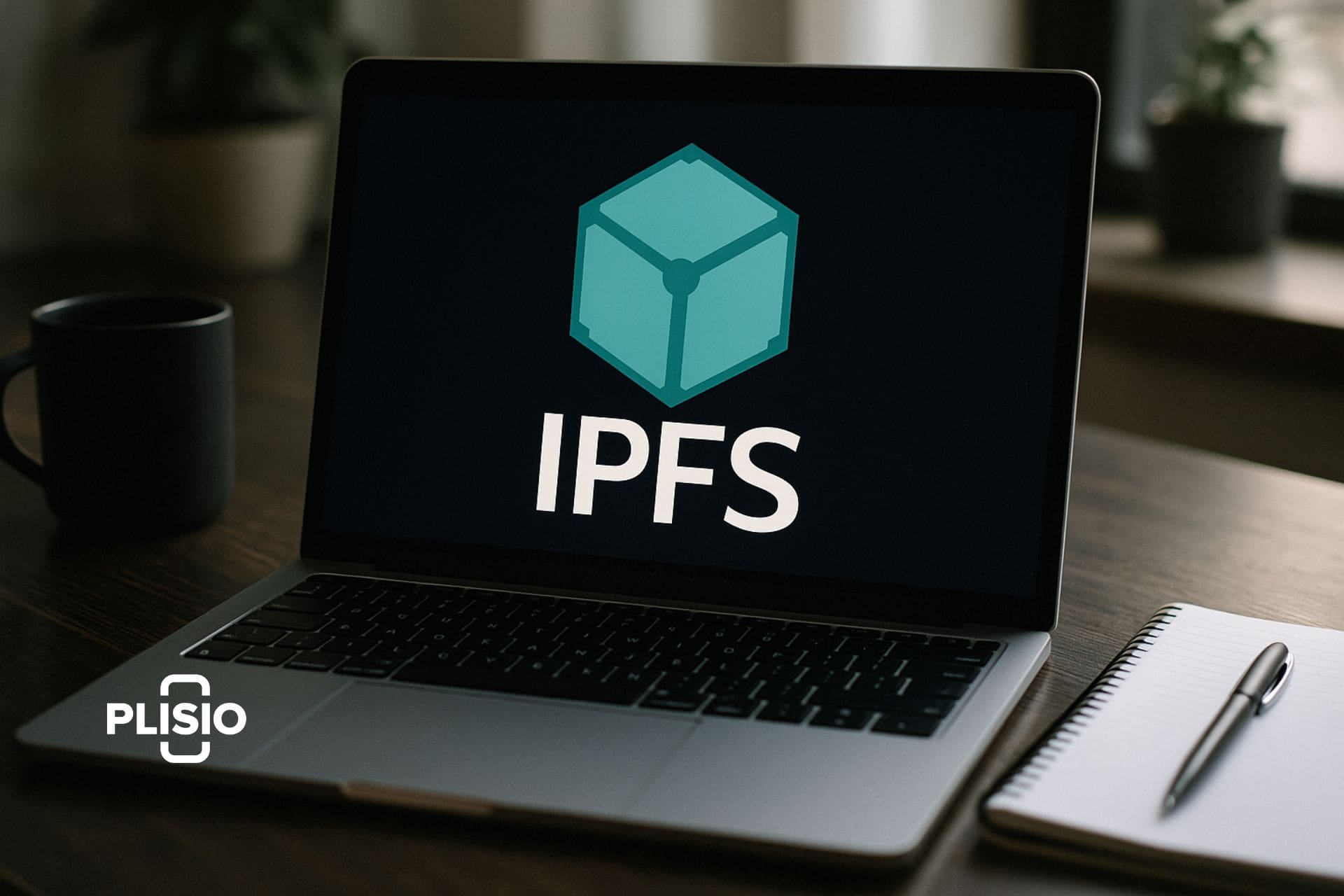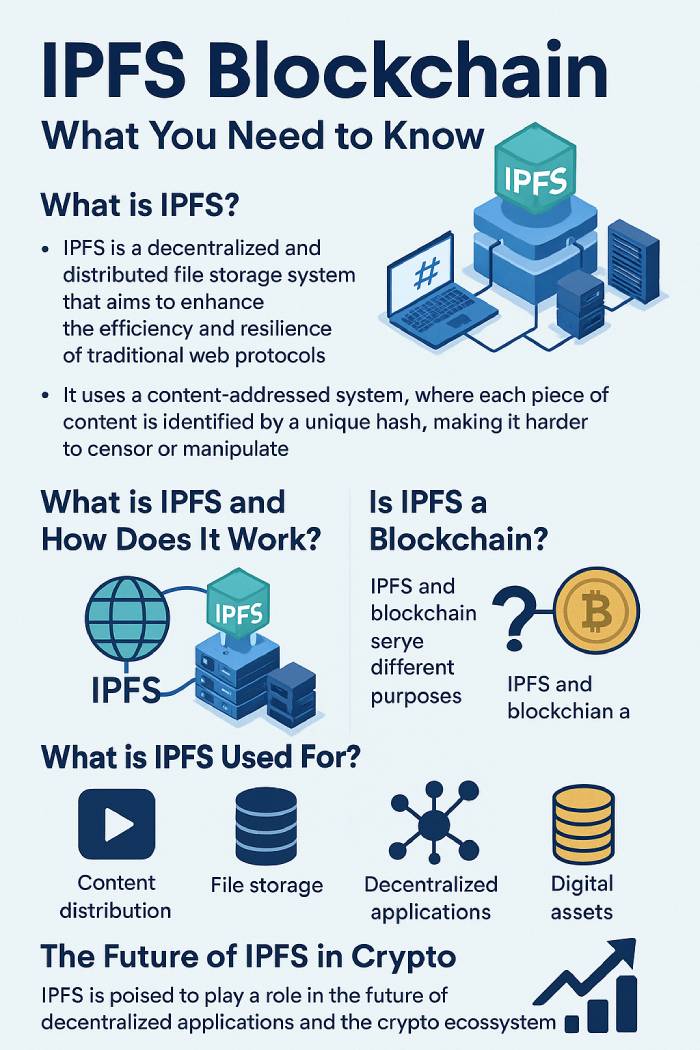IPFS Blockchain: What You Need to Know

In today’s digital era, data storage is more crucial than ever. Every day, we store and share files, photos, and entire applications online. But what happens when centralized servers fail or a website disappears? This is where IPFS, the InterPlanetary File System, becomes essential.
IPFS is a revolutionary decentralized storage protocol that allows users to store and share information across a global peer-to-peer (P2P) network. Instead of relying on a single server, IPFS distributes files across multiple nodes, significantly improving security, accessibility, and resilience.
How Does IPFS Work in Blockchain?
IPFS divides data into smaller pieces, each assigned a unique hash. When data is requested, the IPFS network locates these hashes across multiple nodes and reassembles the content. This distributed file storage system eliminates any single point of failure and ensures faster data retrieval.
Is IPFS a Blockchain?
Although both IPFS and blockchain are decentralized technologies, they serve distinct purposes. IPFS specializes in distributed file storage and data sharing, while blockchains focus on maintaining transparent, tamper-proof transaction records. Often, they work together, with IPFS managing off-chain storage and blockchain safeguarding immutable identifiers.
According to Dr. Juan Benet, founder of Protocol Labs, "IPFS complements blockchain technology perfectly by offering scalable file storage that blockchain alone cannot provide. Together, they build a robust foundation for the decentralized web."
Why IPFS Matters
- Decentralization: Reduces dependence on centralized servers.
- Data Integrity: Hashes ensure data remains unaltered.
- Censorship Resistance: IPFS offers access to information even in restrictive environments.
- Enhanced Speed: P2P networks optimize data retrieval.
Real-World IPFS Use Cases
- NFTs: Store and protect digital assets through decentralized storage.
- Web Hosting: Boost uptime by serving websites via the IPFS network.
- Research Sharing: Enable global, censorship-free file sharing among researchers.
Practical Guide: How to Use IPFS
Getting started with IPFS is simpler than many expect. Here’s a basic step-by-step guide:
- Install IPFS Desktop or Command Line Interface (CLI): Available for Windows, Mac, and Linux.
- Add Files: Upload documents, images, or other content. Each file gets a unique hash.
- Pin Files: Use local pinning or third-party pinning services to ensure data persistence.
- Access Files: Retrieve content by its hash using any IPFS-compatible browser or application.
User Example: Emma, a freelance graphic designer, uses IPFS to back up her portfolio. After losing critical work during a cloud outage, she shifted to IPFS. Now, she stores her artwork across multiple nodes and accesses it securely with content hashes — ensuring her designs are never lost again.

What is IPFS?
The InterPlanetary File System is a visionary storage system linking devices into a unified, decentralized network. Combining Git-style version control with BitTorrent-like distribution, IPFS underpins the rise of decentralized applications and a fully decentralized web.
Since its launch in 2016, IPFS has seen massive adoption. As of early 2025, the IPFS network hosts more than 450 million files and has over 300,000 active nodes globally, according to Protocol Labs.
IPFS integrates seamlessly with protocols like HTTP, FTP, and its native structure, using a Distributed Hash Table (DHT) to locate and store data efficiently.
Distributed Hash Tables and Merkle DAG
At the heart of IPFS is the Merkle Directed Acyclic Graph (DAG), where each node references its content via a unique hash. This structure ensures data integrity, although it raises access concerns: anyone with a file's hash can retrieve it.
IPFS and Blockchain Integration
The partnership between IPFS and blockchain strengthens decentralized systems. Blockchain guarantees data immutability, while IPFS offers scalable, distributed file storage.
Organizations such as iCommunity utilize IPFS to ensure tamper-resistant data storage. Public blockchains like Ethereum and Bitcoin and private networks like Hyperledger Fabric benefit from off-chain storage via IPFS.
Blockchain analyst Laura Shin notes, "The future of Web3 relies heavily on efficient decentralized storage, and IPFS is becoming the go-to solution for developers building resilient applications."
IPFS and Blockchain: Use Cases
Leading companies adopting IPFS include:
- Cloudflare: Operates distributed gateways to enhance IPFS access speed.
- Microsoft ION: Builds decentralized digital identity systems using Bitcoin and IPFS.
- Brave Browser: Hosts decentralized markets through IPFS integration.
- Opera for Android: Offers native support for IPFS links.
- Wikipedia: Maintains a censorship-resistant mirror via IPFS.
- Filecoin: Provides decentralized cloud storage based on IPFS architecture.
IPFS vs HTTP
Unlike HTTP’s location-based retrieval, IPFS uses content hashes to find data, enhancing decentralization, boosting data integrity, and cutting operational costs.
Is IPFS Traceable?
While IPFS offers improved privacy compared to traditional systems, it’s not entirely anonymous. Nodes in the IPFS network can detect content requests unless additional encryption is applied.
Public vs Private IPFS
- Public IPFS: Open to all, fostering accessibility.
- Private IPFS: Access-controlled networks for enhanced security.
Challenges Facing IPFS
- Data Persistence: Requires pinning services to guarantee long-term availability.
- Latency Variability: Retrieval speeds depend on network health.
- Content Moderation: Decentralization complicates regulation.
- Technical Complexity: Operating an IPFS node demands technical expertise.
Future Outlook for IPFS and Blockchain
The role of IPFS in the crypto world is set to expand. By mid-2025, it's projected that over 65% of decentralized applications (DApps) will integrate decentralized storage solutions like IPFS, according to Messari’s latest research.
Dr. Gavin Wood, co-founder of Ethereum and Polkadot, commented, "As decentralized ecosystems mature, solutions like IPFS will be indispensable in ensuring scalability and resilience across blockchain infrastructures."
As decentralized finance (DeFi), NFTs, and Web3 technologies grow, IPFS’s capacity to store data securely and scalably will become increasingly vital for blockchain ecosystems.
Final Thoughts
The InterPlanetary File System represents a fundamental shift toward a decentralized web. Whether you are an innovator in NFTs, a developer of DApps, or simply an advocate for secure data storage, learning to use IPFS is critical for embracing the future internet.
As we move beyond centralized servers to embrace distributed file technologies, IPFS stands as a pillar supporting resilience, freedom, and data integrity for all.




